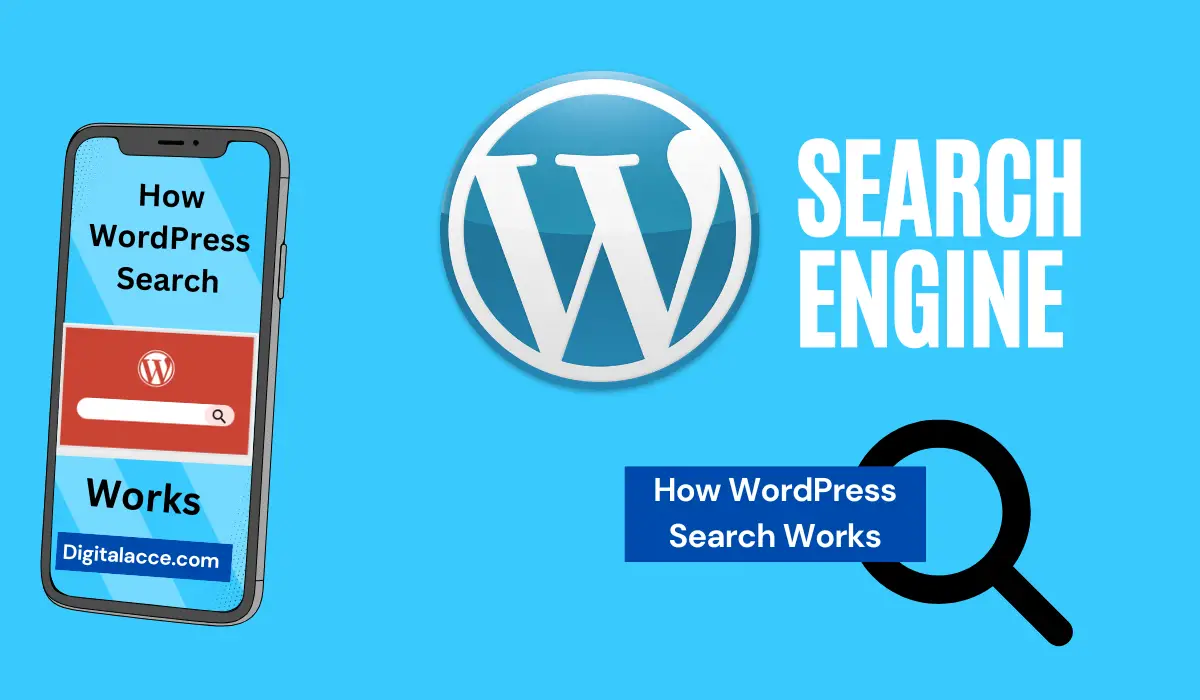WordPress search is a fundamental feature that allows website visitors to easily find relevant content. Understanding how WordPress search works can help website owners optimize their search functionality, improve the user experience, and increase engagement.
In this post, we will provide a comprehensive guide to how WordPress search works, covering everything from the technical workings of the search algorithm and database queries to customizing search behavior, troubleshooting common issues, and best practices for designing and organizing content to improve search results.
Contents
- How WordPress Search Really Works
- Technical overview of the search algorithm and database queries
- In-depth Look Into WordPress Search Algorithm
- Practical Example of How WordPress Search Works
- How WordPress search Engine Works vs Google Search Engine
- Common issues with WordPress search
- How to improve WordPress search performance
- How hosting environment can affect search performance on WordPress
- How to customize the search results page layout and design
- Conclusion
How WordPress Search Really Works
WordPress search works by querying the database for matching content based on the user’s search query. When a user enters a search term, WordPress uses a search algorithm to look for that term in the titles, content, and other relevant fields of the posts and pages in the database.
By default, WordPress uses a basic search algorithm that matches the exact search term or phrase with the content in the database. However, you can customize using various plugins and code modifications. But you must be wary of the vulnerabilities of WordPress plugins.
WordPress also uses relevance factors to determine the order in which search results display. Relevance factors include how closely the content matches the search query, the number of times the search term appears in the content, and the recency of the content.
WordPress also allows for the use of advanced search options, such as searching for content within specific categories, tags, or custom taxonomies. This you can do by using plugins or custom code modifications.
Technical overview of the search algorithm and database queries
The WordPress search uses a search algorithm to query the database for content that matches a user’s search query. The algorithm works by breaking the query down into individual search terms and then matching those terms against various fields in the database, such as post titles, content, tags, and categories.
As mentioned, the search algorithm uses relevance factors to determine the order in which search results are displayed.
WordPress search also uses a database query to retrieve search results. The query is executed using the MySQL database system and consists of several SQL statements that match the search terms against the relevant database fields.
The search query is then sorted based on the relevance factors and the resulting search results are displayed to the user. By default, WordPress displays search results based on relevance. But you can customize this to sort results by date or other criteria.
Overall, the search algorithm and database query that WordPress search use provides robust and flexible search functionality. This functionality you can optimize and customize to meet the specific needs of a website.
In-depth Look Into WordPress Search Algorithm
To really understand how WordPress search works, we need to discuss the algorithm.
The WordPress search uses various relevance factors to determine the order in which search results show to the user. Understanding these factors can help website owners optimize their content and improve search results.
Match quality
The match quality refers to how closely the content matches the search query. The closer the match, the higher the relevance score. For example, a post that contains all of the search terms in the title is more relevant than a post that contains only some of the search terms in the content.
Keyword frequency
The frequency of the search terms within the content is also an important relevance factor. The more frequently the search terms appear in the content, the higher the relevance score.
Keyword proximity
The proximity of the search terms to each other within the content is another factor that affects the relevance score.
For example, a post that contains the search terms in close proximity to each other is more relevant than a post where the search terms scatter throughout the content.
Content type
The type of content also affects the relevance score. For example, a post that contains the search terms in the title is more relevant than a post where the search terms only appear in the content.
Date
The date of the content is also a relevance factor. By default, WordPress search displays the most recent content first. However, you can customize to display content based on other factors, such as popularity or user rating.
By understanding these relevance factors, website owners can optimize their content to improve search results. Also, you should make it easier for users to find what they are looking for.
Practical Example of How WordPress Search Works
To understand how search queries are executed in WordPress and the search results, let’s consider the following example:
Suppose a user enters the search query “best coffee shops” on a WordPress website that features a blog about local food and drink. The search query is sent to the server, which executes the search algorithm and database queries to retrieve matching content.
The search algorithm breaks down the query into individual search terms, “best,” “coffee,” and “shops,” and matches these terms against various fields in the database, such as post titles, content, tags, and categories. The algorithm then calculates the relevance score for each piece of content based on the relevance factors we discussed earlier.
The resulting search results are displayed to the user, typically in a list format. It then shows the post title, excerpt, and other relevant information. The search results are ordered based on their relevance score, with the most relevant content displayed first.
In our example, the search results might include blog posts that discuss the best coffee shops in the area, as well as posts that review individual coffee shops or offer tips for finding the best coffee.
The results may also include posts that mention coffee shops in passing or have the search terms in the tags or categories.
By default, WordPress search displays up to 10 search results per page. However, this can be customized using plugins or code modifications.
Users can also refine their search results by using advanced search filters. Such filters include date range or category, which can help them find more relevant content.
How WordPress search Engine Works vs Google Search Engine
WordPress search engine and Google search engine both serve the same purpose of retrieving relevant content based on a user’s search query. However, there are several key differences between how the two search engines work.
- Indexing: Google indexes web pages from across the internet, while WordPress search only indexes content within the WordPress website. Google’s index is much larger and more comprehensive, making it more likely to retrieve relevant content for a wide variety of search queries.
- Ranking algorithms: Google uses a complex ranking algorithm that takes into account hundreds of different factors, including keywords, page authority, backlinks, and user engagement. The WordPress search uses a simpler algorithm that primarily focuses on matching search terms against content fields and sorting results based on relevance factors.
- Search customization: WordPress search can be customized using plugins and code modifications to improve search behavior and customize search filters. Google search cannot be customized in this way, but users can use advanced search operators to refine their search results.
- Ads and monetization: Google search displays ads alongside organic search results, allowing publishers to monetize their search traffic through paid advertising. WordPress search does not display ads by default. But you can add ads by using plugins or code modifications.
However, you can customize and optimize WordPress search to improve search results within the context of a specific website or blog.
By the way, I believe the Google Search Engine algorithm is overwhelmingly biased.
Common issues with WordPress search
While the WordPress search feature can be useful for finding content on a website, there are several common issues that website owners may encounter. Here are some of the most common issues with WordPress search:
Inaccurate search results
One of the most common issues with WordPress search is inaccurate search results. Some causes include the default search algorithm not being able to handle complex search queries or not taking into account custom post types or taxonomies.
Slow search performance
Another common issue with WordPress search is slow search performance. Some factors that cause this are a large number of posts or pages on the website, slow server response times, or poorly optimized search queries.
Limited search functionality
The default WordPress search feature has limited functionality, which can make it difficult for visitors to find specific content. For example, the default search feature does not allow visitors to search by custom post types or taxonomies.
Search results not displaying properly
Sometimes, search results may not display properly on the search results page. Some causes are poorly formatted search result snippets or conflicts with other plugins or themes.
Search results not being indexed properly
If search results do not index properly, this can lead to inaccurate or incomplete search results. Website’s caching or indexing settings, or by conflicts with other plugins or themes.
Search results not being displayed in the desired order
Sometimes, search results may not show in the desired order. Some causes are issues with the search algorithm or by conflicts with other plugins or themes.
By understanding the common issues with WordPress search, publishers can take steps to address these issues and improve the search experience for their visitors. This you can achieve by customizing the search algorithm, optimizing search queries, or using third-party search plugins or services.
How to improve WordPress search performance
WordPress search performance can be improved by doing some things. Here are some tips to improve WordPress search performance:
Optimize the search algorithm
The default WordPress search algorithm is simple and may not always return accurate results. Optimizing the algorithm can improve search accuracy and speed. You can use plugins like Relevanssi or SearchWP to improve the default search algorithm.
Improve the database structure
The database structure can also affect search performance. WordPress stores all content in the database, so optimizing the database structure can speed up search queries. You can use plugins like WP Optimize or WP-DBManager to optimize your WordPress database.
Use a caching plugin
Caching plugins can speed up your WordPress site by serving cached content to visitors. When a user searches your site, the search results are cached, making subsequent search queries faster. You can use plugins like WP Super Cache or W3 Total Cache to enable caching on your WordPress site.
Use a third-party search service
If you have a large WordPress site with lots of content, a third-party search service like Algolia or ElasticSearch can improve search performance by offloading the search queries to a separate server. These services provide powerful search functionality and can significantly improve search speed and accuracy.
Use search plugins
WordPress search plugins can add additional search functionality to your site, such as autocomplete, faceted search, and advanced search filters. Plugins like SearchWP, Ajax Search Lite, or Swiftype can improve the user experience and make it easier for visitors to find the content they are looking for.
By implementing these tips, you can improve the performance of your WordPress search and provide a better user experience for your visitors.
How hosting environment can affect search performance on WordPress
The hosting environment can have a significant impact on WordPress search performance. Here are some ways in which the hosting environment can affect search performance:
Server resources
The server resources available to your WordPress site can affect search performance. If you host your site on a shared server with limited resources, search queries can be slow and unresponsive. Upgrading to a dedicated cloud server or a virtual private server (VPS) can provide more resources and improve search performance.
Server location
The location of the server can also affect search performance. If your server is located far away from your target audience, search queries can take longer to process. Choosing a server location closer to your target audience can reduce the latency and improve search performance.
Server configuration
The server configuration can affect search performance. If the server is not optimized for WordPress, search queries can be slow and unresponsive. Server configuration includes the type of web server used, the PHP version, the database software, and other settings. Optimizing the server configuration can improve search performance.
Content delivery network (CDN)
A content delivery network (CDN) can improve search performance by caching search results and serving them from a network of distributed servers. This reduces the load on the WordPress server and speeds up search queries. CDNs like Cloudflare, KeyCDN, and MaxCDN can significantly improve search performance.
Security measures
Security measures such as firewalls and anti-malware software can also affect search performance. If the security measures are not optimized, they can interfere with search queries and slow down search performance. Optimizing security measures can improve search performance and protect your site from threats.
In summary, the hosting environment can affect search performance in various ways. Choosing a high-quality hosting provider, optimizing server resources and configuration, and using a CDN can all help to improve search performance and provide a better user experience for your visitors.
How to customize the search results page layout and design
Customizing the search results page layout and design can help improve the user experience and make it easier for visitors to find the content they are looking for. Here are some examples of how to customize the search results page layout and design:
Adjust the number of search results per page
By default, WordPress displays ten search results per page. You can change this number to display more or fewer results per page by modifying the search query. This you can do by adding code to the functions.php file or using a plugin like SearchWP.
Customize the search results layout
You can customize the layout of the search results page to better suit your website design. This you can do by using CSS or by creating a custom template for the search results page. You can achieve this by creating a file called search.php in your theme folder, and then adding custom code to it to display the search results in the desired layout.
Add featured images to search results
Adding featured images to search results can make the search results page more visually appealing and help visitors find the content they are looking for more easily. You can do this by modifying the search results template code to display the featured image.
Add custom fields to search results
If you have custom fields in your WordPress posts or pages, you can display them in the search results to provide additional information to visitors. Modify the search results template code to display the custom field data.
Highlight search terms
Highlighting search terms in the search results can help visitors find the content they are looking for more easily. Use CSS or a plugin like SearchWP or Relevanssi.
Add pagination to search results
If you have a large number of search results, it’s important to add pagination to the search results page. You can do this by using the built-in WordPress pagination function or by using a plugin like SearchWP or Relevanssi.
Customizing the search results page layout and design can improve the user experience and make it easier for visitors to find the content they are looking for on your website.
Conclusion
Understanding how WordPress search works and the common issues that can arise is essential for website owners who want to improve the search experience for their visitors.
By customizing the search algorithm, optimizing search queries, and using rich snippets, website owners can improve the search visibility of their content and make it easier for visitors to find their content.
With the right approach, website owners can create a powerful search experience that helps visitors find exactly what they’re looking for, leading to increased traffic, engagement, and conversions.


